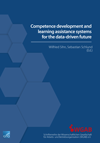Search


Bibtex
Cite as text
@Article{,
Year= "2021",
Volume= "Schriftenreihe der Wissenschaftlichen Gesellschaft für Arbeits- und Betriebsorganisation (WGAB) e.V.",
Pages= "93-108",
Journal = "WGAB",
Title= "A Learning Assistance System for the Ergonomic Behavioural Prevention in Production ",
Author= "Justus Brosche M.Sc.
Production Management and Technology
Hamburg University of Technology
Hannes Wackerle M.Sc. M.Sc
Institute for Biomechanics
BG Clinical Center Murnau gGmbH
Institute for Biomechanics
Paracelsus Medical Private University Salzburg
Prof. Dr. hum. Boil. Peter Augat
Institute for Biomechanics
BG Clinical Center Murnau GmbH
Institute for Biomechanics
Paracelsus Medical Private University Salzburg
Prof. Dr.-Ing. habil. Hermann Lödding
Production Management and Technology Hamburg University of Technology
",
Doi= "https://doi.org/10.30844/wgab_2021_6",
Abstract= "Musculoskeletal disorders are the major cause for incapacity for work in the Ger-man production industry. Accordingly, ergonomic work processes are particularly important in order to protect the health of employees and to reduce the high follow-up costs for companies and society.
Therefore, on the one hand, it is necessary to make workplaces more ergonomic (so-called organisational prevention). On the other hand, employees need to be trained how to carry out work processes as ergonomically as possible and thus optimise their individual behav-iour at the workplace (so-called behavioural prevention).
The article presents a learning assistance system for ergonomic be-havioural prevention in production that uses modern motion capture systems to record and analyse the movements of employees. With the help of digital human models, it is possible to visualise overload on the body comprehensively. The learning assistance system ena-bles the employee to perform two primary analyses:
A capability analysis allows to measure and assess a worker’s individ-ual mobility with 14 standardised movement exercises and to esti-mate his or her strength with a grip strength measurement. The as-sessment of the results strengthens health literacy in the way that the worker becomes aware of possible physical limitations and can initiate general countermeasures, such as strength or mobility train-ing.
An analysis of the specific work processes at the workplace makes it possible to record the workplace-induced stress of a worker and compare it with the worker’s capabilities. This comparison leads to the workplace-specific strain and shows which movements are par-ticularly critical for the health of the individual worker. It enables the worker to recognise the critical work processes and postures of his or her work spectrum, to initiate work-specific measures to in-crease the capabilities and to ergonomically improve the working posture. The latter is the main purpose of the learning assistance system. The use of a motion capture system permits to repeat critical work steps effortlessly in order to show the effect of a more ergo-nomic working posture. These short learning cycles can be repeated until the strain is not critical anymore.
",
}
Justus Brosche M.Sc.
Production Management and Technology
Hamburg University of Technology
Hannes Wackerle M.Sc. M.Sc
Institute for Biomechanics
BG Clinical Center Murnau gGmbH
Institute for Biomechanics
Paracelsus Medical Private University Salzburg
Prof. Dr. hum. Boil. Peter Augat
Institute for Biomechanics
BG Clinical Center Murnau GmbH
Institute for Biomechanics
Paracelsus Medical Private University Salzburg
Prof. Dr.-Ing. habil. Hermann Lödding
Production Management and Technology Hamburg University of Technology(2021): A Learning Assistance System for the Ergonomic Behavioural Prevention in Production . Schriftenreihe der Wissenschaftlichen Gesellschaft für Arbeits- und Betriebsorganisation (WGAB) e.V.(2021), S. 93-108. Online: https://doi.org/10.30844/wgab_2021_6 (Abgerufen 23.02.26)
Open Access
Abstract
Abstract
Musculoskeletal disorders are the major cause for incapacity for work in the Ger-man production industry. Accordingly, ergonomic work processes are particularly important in order to protect the health of employees and to reduce the high follow-up costs for companies and society. Therefore, on the one hand, it is necessary to make workplaces more ergonomic (so-called organisational prevention). On the other hand, employees need to be trained how to carry out work processes as ergonomically as possible and thus optimise their individual behav-iour at the workplace (so-called behavioural prevention). The article presents a learning assistance system for ergonomic be-havioural prevention in production that uses modern motion capture systems to record and analyse the movements of employees. With the help of digital human models, it is possible to visualise overload on the body comprehensively. The learning assistance system ena-bles the employee to perform two primary analyses: A capability analysis allows to measure and assess a worker’s individ-ual mobility with 14 standardised movement exercises and to esti-mate his or her strength with a grip strength measurement. The as-sessment of the results strengthens health literacy in the way that the worker becomes aware of possible physical limitations and can initiate general countermeasures, such as strength or mobility train-ing. An analysis of the specific work processes at the workplace makes it possible to record the workplace-induced stress of a worker and compare it with the worker’s capabilities. This comparison leads to the workplace-specific strain and shows which movements are par-ticularly critical for the health of the individual worker. It enables the worker to recognise the critical work processes and postures of his or her work spectrum, to initiate work-specific measures to in-crease the capabilities and to ergonomically improve the working posture. The latter is the main purpose of the learning assistance system. The use of a motion capture system permits to repeat critical work steps effortlessly in order to show the effect of a more ergo-nomic working posture. These short learning cycles can be repeated until the strain is not critical anymore.
Keywords
Schlüsselwörter
References
Referenzen
.

 Deutsch
Deutsch
